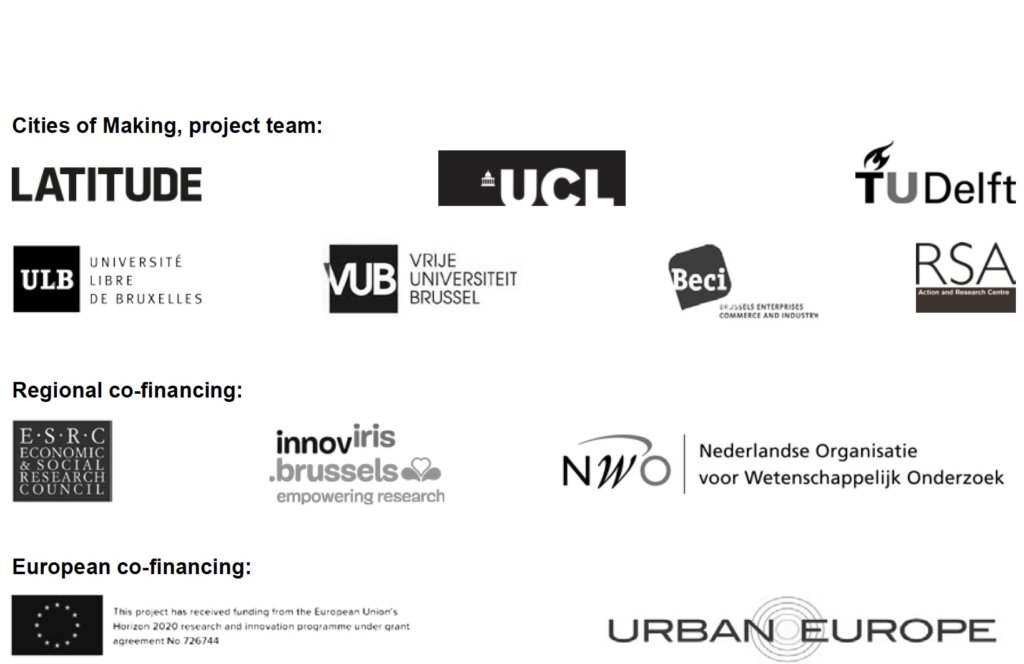Team
Cities of Making is a 2.5 year JPI Urban Europe funded research project exploring the future of urban manufacturing in Europe with the focus on three cities: Brussels, London and Rotterdam. The project involves seven organisations: Brussels Enterprises Commerce and Industry, Latitude Platform for Urban Research and Design, Technical University of Delft, The RSA, l’Université libre de Bruxelles, University College London, Vrije Universiteit Brussel.
The core team involves Adrian Vickery Hill (project initiator and project coordinator), Alexandre Orban, Ben Croxford, Birgit Hausleitner, Fabio Vanin, Han Meyer, Laura Rebreanu, Lise Nakhlé, Josie Warden & Víctor Muñoz Sanz.
BRUSSELS
Latitude. Latitude is a strongly engaged in context-based research and design platform, gathering scholars and professionals from different domains. We aim to understand space in its multiple dimensions focusing on well-established urban conditions and territories, as well as liminal physical and social contexts, experimenting with a wide range of tools for investigation and dissemination at the intersection between urban design and anthropology. Team: Adrian Vickery Hill (project coordinator), Federico Gobatto, Alessandra Macron, Octavio Aramburu and Caterina Dubini.
ULB – LoUIsE. The research of LoUIsE – Laboratory on Urbanism, Infrastructures and Ecologies – is oriented towards the knowledge, understanding and comparison of the dynamics of transformation of metropolitan areas starting from the region of Brussels-Capital. The knowledge and understanding of dynamics are mainly based on observation, critical analysis and the fabrication of urban projects. Research is organised according to the three axes – urbanism, infrastructure and ecology. Team: Geoffrey Grulois, Fabio Vanin
VUB – Cosmopolis. The Cosmopolis Centre for Urban Research, based in the Department of Geography of the Vrije Universiteit Brussel, is dedicated to research and teaching in geography, spatial planning and urban design. Committed to pursuing both academic and practice relevant research, Cosmopolis actively engages policy makers, governments, citizen networks and other urban partners to transform knowledge into action. Team: Fabio Vanin and Alexandre Orban
BECI. The Chamber of Commerce & Business Union of Brussels (BECI) connects the interests of some 35,000 individuals and businesses while providing support in managing 21st century business challenges. We support our members through interpretation of legislation, legal issues, support with funding and financing, to best practice and transitions to innovation. We also reach out to public authorities to ensure that their voice is being heard and reflected in public policy. Team: Lise Nakhlé and Laura Rebreanu
LONDON
UCL – CircEL. The UCL’s Circular Economy Lab is an exciting cross-faculty, cross-discipline initiative, aiming to use UCL’s expertise to improve the design of buildings and products, their re-use and recycling, and the return of their constituent materials back to the economy. Since founding the Lab in 2015, Circular Economy has become a far more mainstream topic and interest has continued to grow in and around our activities. See below for more information. We are aiming to develop the scientific and socio-economic understanding and technological basis for design and implementation of systems, processes and policy that will support the transition to a Circular Economy. With access to the full width and depth of UCL expertise, CircEL will be capable of tackling Circular Economy related problems of any size or stage of development. It is essential that CircEL research and technology development is driven by the needs of the industrial/business community. We envision support of, and guidance by, an industrial ecosystem composed of one or two compatible large companies and several well-matched small/medium-sized enterprises (SMEs), each with its own symbiotic ecological niche. Team: Dr Teresa Domenech and Dr Ben Croxford.
The RSA. The RSA (Royal Society for the encouragement of Arts, Manufactures and Commerce) believes that everyone should have the freedom and power to turn their ideas into reality – we call this the Power to Create. Through our ideas, research and 29,000-strong Fellowship, we seek to realise a society where creative power is distributed, where concentrations of power are confronted, and where creative values are nurtured. The RSA Action and Research Centre combines practical experimentation with rigorous research to achieve these goals. Team: Josie Warden, Ben Dellot, Fabian Wallace-Stephens
ROTTERDAM
TU Delft. The Chair of Urban Design – Urban Compositions – is concerned with the design of the physical form of urban areas and the complex relationships between urban form and social processes. We have an expertise in spatial analysis, with a focus on evaluating the built form including architecture and open space, public as well as private space and its different uses. We are developing innovative concepts and approaches for urban analysis and design, acknowledging contextual changes that call for a rethinking of theory and method in urban design. The object of urban design – the city – is changing rapidly: in the Netherlands and across the globe, complex urban regions are emerging. A whole range of systemic changes in relation to, for example, transport, water management, energy production and consumption but also the social composition of cities and urban regions means that the assumptions about the relations between urban form and social activity are becoming outdated. We understand cities as ‘complex adaptive systems’ that comprise a multitude of dynamic interconnections and flows that adjust to each other irrespective of plans or designs. Team: Prof. dr. ir. Han Meyer, DI. Birgit Hausleitner, Dr. Víctor Muñoz Sanz, Ir. Anouk Klapwijk (research assistant), Anne de Jong (research assistant), Ricardo Avella(research assistant), Rajat Uchil (research assistant).
